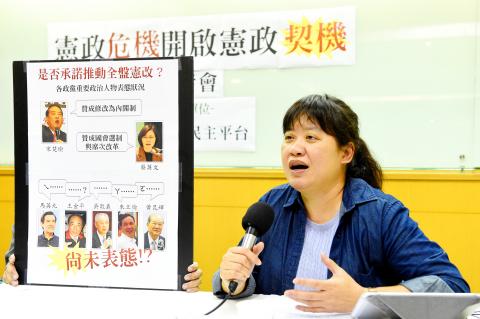The constitutional and political crises highlighted by the recent political upheaval in the nine-in-one elections on Saturday last week could be a turning point for long-overdue constitutional amendments, including those concerning the government institution and legislative electoral system, Taiwan Democracy Watch said yesterday.
The Chinese Nationalist Party (KMT) received a drubbing in the elections, which resulted in President Ma Ying-jeou’s (馬英九) resignation as KMT chairman and the mass resignation of Premier Jiang Yi-huah’s (江宜樺) Cabinet.
Following the political upheaval, Ma promoted Vice Premier Mao Chi-kuo (毛治國) to succeed Jiang as premier, which has “re-exposed Taiwan’s constitutional-political crisis that has existed for a long time and sparked the Sunflower movement or — even earlier — the September strife, a political feud last year between the president and Legislative Speaker Wang Jin-pyng (王金平),” said National Taiwan University (NTU) law professor Yen Chueh-an (顏厥安), who is also one of the watchdog group’s supervisors.

Photo: Chen Chih-chu, Taipei Times
“A premier without a mandate being named by a president who has lost public support and trust has officially turned the Cabinet into a caretaker institution and made it even harder to discern who the real decisionmaker is and how the decisionmaking mechanism works,” Yen said.
The institution that grants the president the right to make weighty decisions that are executed by the Executive Yuan, which is accountable to the Legislative Yuan, leads to a “super-president” who has power, but cannot be held accountable in any meaningful way, Yen said.
“The selection of the Cabinet needs no approval from the legislature either, and while the president is of the same party as that holding a legislative majority, the whole executive institution could simply bypass proper procedure and the president — as party chairman — could bend party legislators to his will,” Yen added.
That a premier without a public support base was appointed by a president who no longer has the popular mandate shows that the nation’s democracy has been “temporarily suspended,” Yen said.
Chen Chao-ju (陳昭如), another NTU law professor, said that 2016 — the year of presidential and legislative elections — would be a good time to conduct a referendum to amend the Constitution.
“And if it is to be done, then a ‘defrosting’ of the Constitution — completing procedures that face an extremely high threshold to see amendments — should start now, with participation from civic groups and the public in deliberation of the issues,” Chen said.
“As the Democratic Progressive Party is most likely to be the governing party after the 2016 vote, it should propose the amendments,” said Liu Ching-yi (劉靜怡), another NTU law professor.
She called on political heavyweights, including Ma, Wang, Vice President Wu Den-yih (吳敦義), who is also acting chairman of the KMT, New Taipei City Mayor Eric Chu (朱立倫) and Taiwan Solidarity Union Chairperson Huang Kun-huei (黃昆輝), to seize the opportunity and make the changes with what would be “unprecedented good timing.”

Trips for more than 100,000 international and domestic air travelers could be disrupted as China launches a military exercise around Taiwan today, Taiwan’s Civil Aviation Administration (CAA) said yesterday. The exercise could affect nearly 900 flights scheduled to enter the Taipei Flight Information Region (FIR) during the exercise window, it added. A notice issued by the Chinese Civil Aviation Administration showed there would be seven temporary zones around the Taiwan Strait which would be used for live-fire exercises, lasting from 8am to 6pm today. All aircraft are prohibited from entering during exercise, it says. Taipei FIR has 14 international air routes and

The Ministry of National Defense (MND) today released images of the military tracking China’s People's Liberation Army (PLA) movements during the latest round of Chinese drills around Taiwan. The PLA began "Justice Mission 2025" drills today, carrying out live-fire drills, simulated strikes on land and maritime targets, and exercises to blockade the nation's main ports. The exercises are to continue tomorrow, with the PLA announcing sea and air space restrictions for five zones around Taiwan for 10 hours starting from 8:30am. The ministry today released images showing a Chinese J-16 fighter jet tracked by a F-16V Block 20 jet and the

Snow fell on Yushan (Jade Mountain, 玉山) yesterday morning as a continental cold air mass sent temperatures below freezing on Taiwan’s tallest peak, the Central Weather Administration (CWA) said. Snowflakes were seen on Yushan’s north peak from 6:28am to 6:38am, but they did not fully cover the ground and no accumulation was recorded, the CWA said. As of 7:42am, the lowest temperature recorded across Taiwan was minus-5.5°C at Yushan’s Fengkou observatory and minus-4.7°C at the Yushan observatory, CWA data showed. On Hehuanshan (合歡山) in Nantou County, a low of 1.3°C was recorded at 6:39pm, when ice pellets fell at Songsyue Lodge (松雪樓), a

City buses in Taipei and New Taipei City, as well as the Taipei MRT, would on Saturday begin accepting QR code payments from five electronic payment providers, the Taipei Department of Transportation said yesterday. The new option would allow passengers to use the “transportation QR code” feature from EasyWallet, iPass Money, iCash Pay, Jkopay or PXPay Plus. Passengers should open their preferred electronic payment app, select the “transportation code” — not the regular payment code — unlock it, and scan the code at ticket readers or gates, General Planning Division Director-General Liu Kuo-chu (劉國著) said. People should move through the